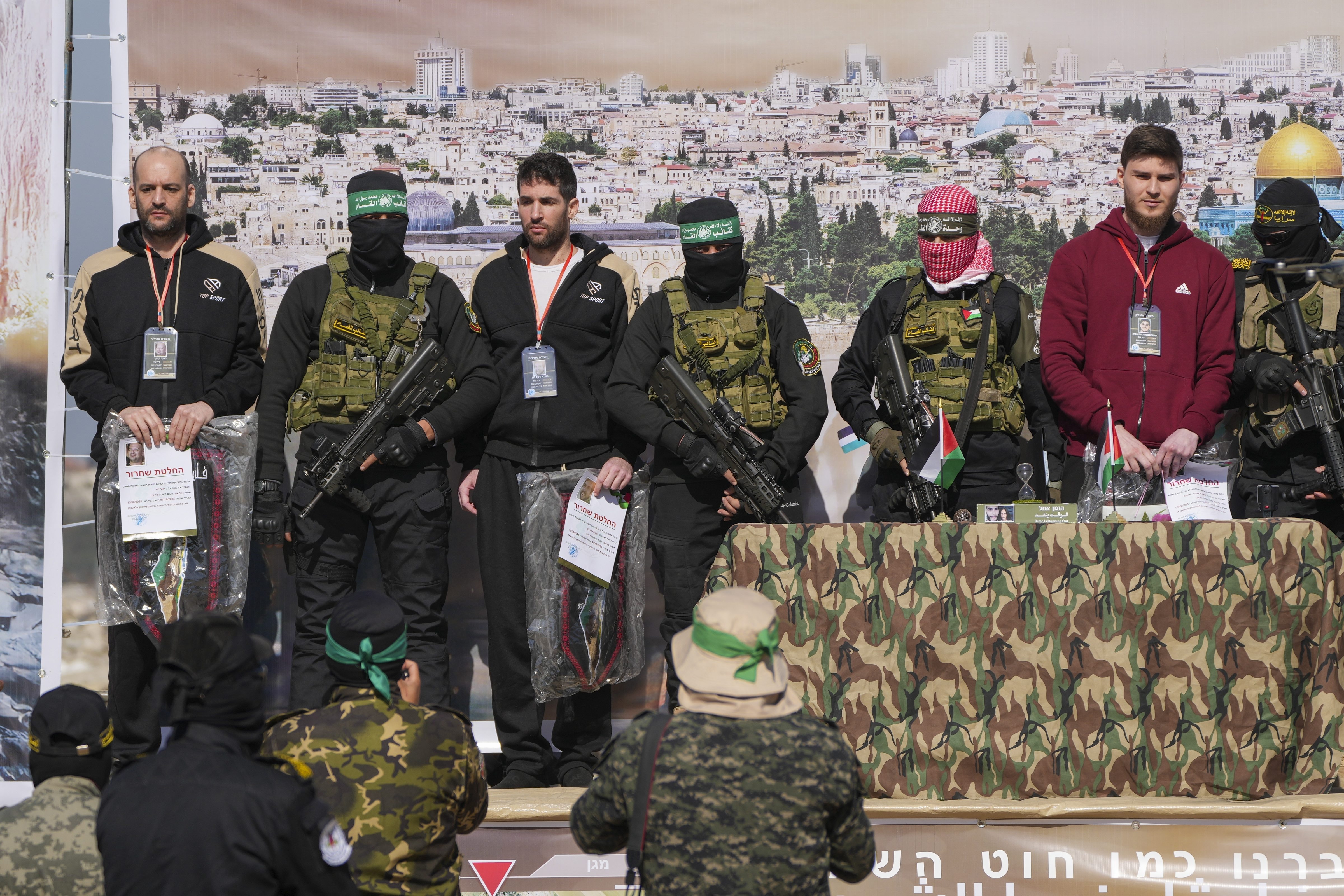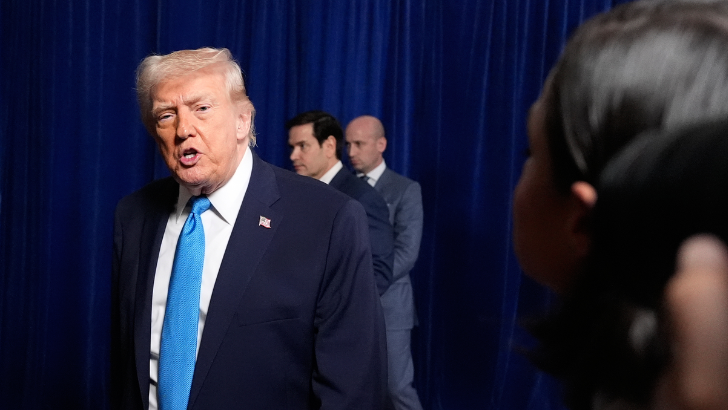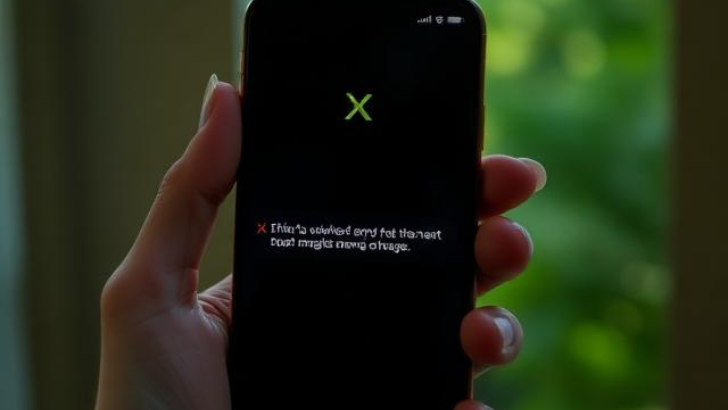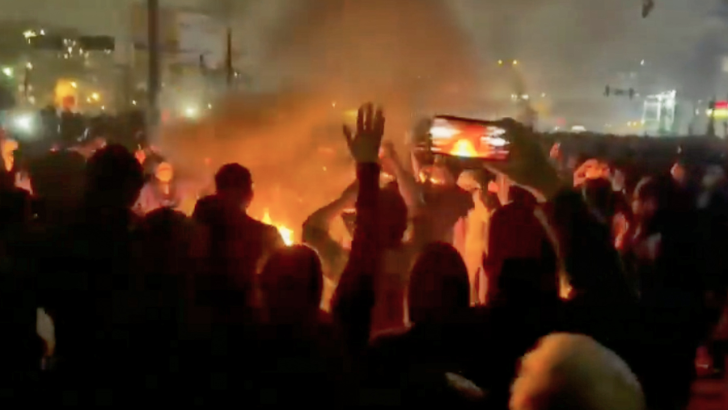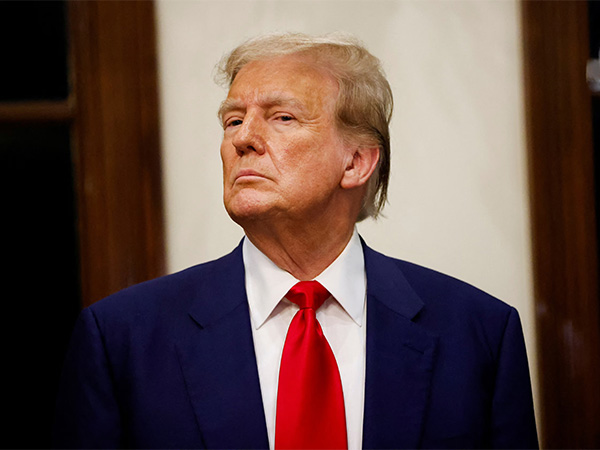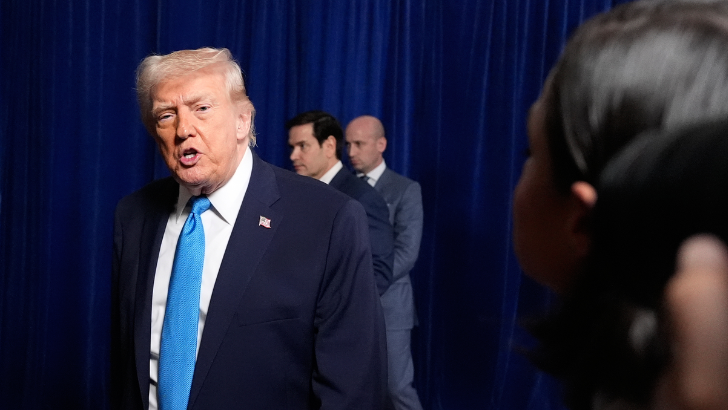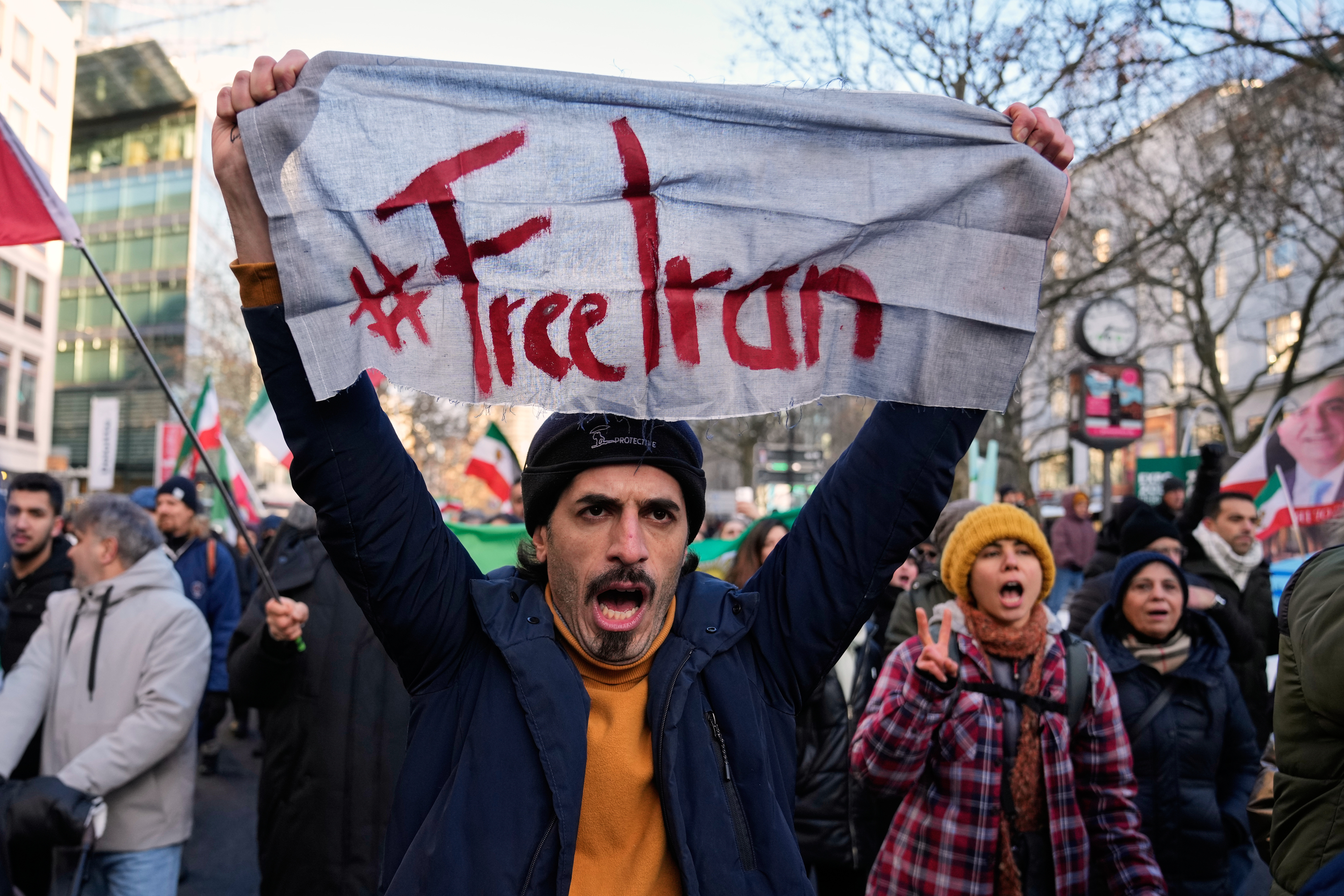3 hostages are with Israeli forces after Hamas released them to Red Cross in Gaza
US President Donald Trump's controversial proposal to remove more than 2 million Palestinians from Gaza and settle them elsewhere in the region has cast even more doubt on the future of the ceasefire.
PTI
-
Israeli hostages are escorted by Hamas and Islamic Jihad fighters as they are handed over to the Red Cross in Khan Younis
KHAN YOUNIS, 15 FEB
Hamas-led militants
released three male Israeli hostages Saturday, parading them before a crowd in
the southern Gaza Strip before handing them over to the Red Cross as part of a
shaky ceasefire deal that requires Israel to release hundreds of Palestinian
prisoners in exchange.
The
Red Cross delivered the three — Iair Horn, 46, a dual citizen of Israel and
Argentina; American-Israeli Sagui Dekel Chen, 36; and Russian-Israeli Alexander
(Sasha) Troufanov, 29 — to the Israeli military, which said they were being
taken for medical treatment and to be reunited with their relatives.
All
were abducted in the 7 October, 2023, attack that ignited the war. They
appeared pale and worn, but seemed to be in better physical condition than the
three men released last Saturday, who had emerged emaciated from 16 months of
captivity.
The
truce that began nearly four weeks ago had been jeopardised in recent days by a
tense dispute that threatened to renew the fighting.
US
President Donald Trump's controversial proposal to remove more than 2 million
Palestinians from Gaza and settle them elsewhere in the region has cast even
more doubt on the future of the ceasefire.
But
Hamas said Thursday it would move ahead with the release of more hostages after
talks with Egyptian and Qatari officials. The group said the mediators had
pledged to “remove all hurdles” to ensure Israel would allow more tents,
medical supplies and other essentials into Gaza.
It is
the sixth swap since the ceasefire took effect on 19 January. So far, 21
hostages and over 730 Palestinian prisoners have been freed during the first
phase of the truce.
As
with previous exchanges, the hostage release was heavily choreographed, with
the captives made to walk onto a stage and make remarks into microphones before
the crowd. Dozens of masked, armed Hamas fighters lined up near the stage
festooned with Palestinian flags and the banners of militant factions while
music blared from loudspeakers.
In
Tel Aviv's Hostages Square, a huge cheer went up as the hostages were
transferred to the Red Cross. “Iair, Sagui, and Sasha are on their way home!”
an announcer said.
Who
are the hostages and prisoners being released?
The
three hostages were abducted from Kibbutz Nir Oz, one of the hardest-hit
communities in southern Israel during the Hamas-led October 7, 2023, attack
that ignited the devastating war.
Horn
was abducted along with his brother, Eitan Horn, who had been staying with him
at the time. Eitan remains in captivity.
Dekel
Chen had been working outside when militants stormed the kibbutz. His wife hid
in a safe room with their two daughters. She gave birth to their third daughter
two months later.
Troufanov
was taken hostage along with his grandmother, mother and girlfriend. The three
women were released during a brief ceasefire in November 2023. Troufanov's
father was killed in the October 7 attack.
The
Hamas-linked Prisoners' Information Office said Friday that 369 Palestinians
were set to be released from Israeli prisons on Saturday. It said 36 of those
were serving life sentences.
Among
the most prominent Palestinian prisoners set to be released is Ahmed Barghouti,
48, a close aide of Marwan Barghouti, a militant leader and iconic Palestinian
political figure.
Israel
sentenced Ahmed Barghouti to life on charges that he dispatched suicide bombers
during the Second Intifada, or Palestinian uprising, in the early 2000s to
carry out attacks that killed Israeli civilians. He was arrested alongside
Marwan Barghouti in 2002.
Concerns
are high about the remaining hostages' condition
Of
the 251 people abducted, 73 remain in Gaza, around half of whom are believed to
be dead. Nearly all the remaining hostages are men, including Israeli soldiers.
Concern
has been growing about the remaining hostages' condition, particularly after
the release of three last Saturday, who emerged looking emaciated and frail.
One
of them, 65-year-old Keith Siegel, said Friday in a video message addressed to
Trump that his captors treated him worse as the 15-month war intensified,
kicking him, spitting on him and holding him without water or light.
The
truce remains very fragile
The
ceasefire appeared dangerously close to collapse in recent days.
Hamas
had said it would delay the release of the hostages after accusing Israel of
not adhering to their agreement by not allowing in enough shelters, medical
supplies, fuel and heavy equipment for clearing rubble. Israel said it would
resume fighting Saturday unless hostages were freed.
While
the immediate crisis may have been averted, the truce faces a much bigger
challenge with the deal's first phase set to conclude in early March. There
have not yet been substantive negotiations over the second phase, in which
Hamas would release all remaining hostages in return for an end to the war.
At
its height, the fighting displaced 90 per cent of Gaza's population of 2.3
million. Hundreds of thousands have since returned to their homes as the
ceasefire took hold, though many found only rubble, buried human remains and
unexploded ordnance.
The
war has killed over 48,000 Palestinians, mostly women and children, according
to Gaza's health Ministry, which does not say how many were fighters. Israel
says it has killed over 17,000 militants, without providing evidence.
Trump's
plan increases uncertainty
Trump's
proposal to remove some 2 million Palestinians from Gaza and settle them
elsewhere in the region has thrown the truce's future into further doubt.
The
idea has been welcomed by Israel's government. But it has been strongly
rejected by Palestinians and Arab countries. Human rights groups say it could
amount to a war crime under international law.
Trump
has proposed that once the fighting ends, Israel would transfer control of Gaza
to the United States, which would then redevelop it as the “Riviera of the
Middle East.”
Prime
Minister Benjamin Netanyahu's far-right allies are already calling for a
resumption of the war after the first phase with the goal of destroying Hamas
and implementing Trump's plan. The militant group remains in control of the
territory after surviving one of the deadliest and most destructive military
campaigns in recent history.
Hamas
may be unwilling to release any more hostages if it believes the war will
resume. The captives are among the only bargaining chips it has left.
Leave a Reply
Your email address will not be published. Required fields are marked *








